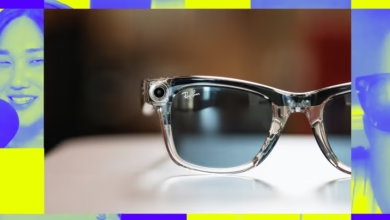Meta’s Smart Glasses Flop: The Real Reason Wasn’t Wi-Fi

▼ Summary
– Meta experienced technical issues during live demos of its new smart glasses, which were explained by Chief Technology Officer Andrew Bosworth.
– The first demo failed because the AI command activated every pair of Meta Ray-Bans in the building, causing a self-inflicted DDoS attack due to server routing.
– Meta had mistakenly routed all Live AI traffic from that building’s access points to a development server, contradicting Mark Zuckerberg’s onstage claim that Wi-Fi was the issue.
– The second demo issue involved a rare bug where the glasses went to sleep just as a call notification arrived, preventing the call from being answered.
– Despite the problems, Meta’s honest live demonstration was noted as a refreshing contrast to the pre-recorded or error-prone showcases common among tech companies like Apple and Google.
Meta’s recent live demonstration of its new smart glasses encountered significant technical difficulties, revealing unexpected challenges behind the scenes. During the event, two separate demos experienced notable failures, prompting an explanation from the company’s leadership.
Andrew Bosworth, Meta’s chief technology officer, clarified the issues in a recent Instagram Q&A session. The first problem occurred when an influencer attempted to activate the AI assistant for cooking instructions. Bosworth explained that the voice command triggered every pair of Meta Ray-Ban smart glasses within the building to respond simultaneously. He described the incident as a self-inflicted distributed denial-of-service (DDoS) scenario, caused by routing all Live AI traffic to a development server intended for isolation. This setup inadvertently affected every device connected to the same network access points.
Contrary to initial claims about Wi-Fi instability, the root cause was an internal configuration error rather than connectivity problems. The second malfunction took place when Mark Zuckerberg tried to answer a WhatsApp call through the glasses. Bosworth characterized this as a “never-before-seen bug” linked to the device entering sleep mode at the exact moment the call notification arrived. This timing conflict prevented the call from being properly received. Although the issue has since been resolved, Bosworth acknowledged the unfortunate timing of its appearance during a high-profile live demo.
Despite these setbacks, the candid nature of Meta’s live product demonstration stands in contrast to the highly polished, pre-recorded presentations often favored by competitors. The willingness to showcase real-time functionality, flaws and all, offers a refreshing glimpse into the actual user experience, diverging from the scripted perfection typically associated with tech launches.
(Source: The Verge)



